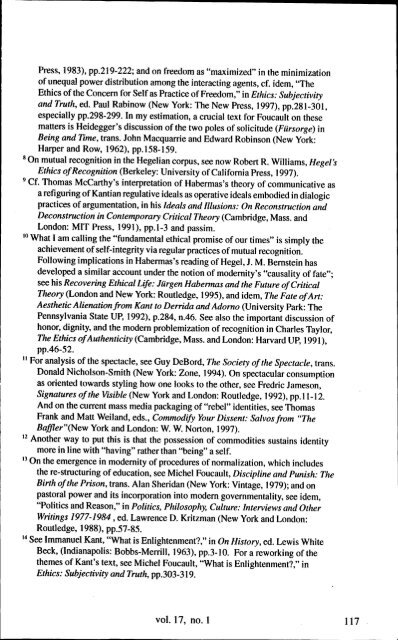Art Criticism - The State University of New York
Art Criticism - The State University of New York
Art Criticism - The State University of New York
Create successful ePaper yourself
Turn your PDF publications into a flip-book with our unique Google optimized e-Paper software.
Press, 1983), pp.219-222; and on freedom as "maximized" in the minimization<br />
<strong>of</strong> unequal power distribution among the interacting agents, cf. idem, ''<strong>The</strong><br />
Ethics <strong>of</strong> the Concern for Self as Practice <strong>of</strong> Freedom," in Ethics: Subjectivity<br />
and Truth, ed. Paul Rabinow (<strong>New</strong> <strong>York</strong>: <strong>The</strong> <strong>New</strong> Press, 1997), pp.281-301,<br />
especially pp.298-299. In my estimation, a crucial text for Foucault on these<br />
matters is Heidegger's discussion <strong>of</strong> the two poles <strong>of</strong> solicitude (Fiirsorge) in<br />
Being and Tune, trans. John Macquarrie and Edward Robinson (<strong>New</strong> <strong>York</strong>:<br />
Harper and Row, 1962), pp.l58-159.<br />
8 On mutual recognition in the Hegelian corpus, see now Robert R. Williams, Hegel's<br />
Ethics <strong>of</strong> Recognition (Berkeley: <strong>University</strong> <strong>of</strong> California Press, 1997).<br />
9 Cf. Thomas McCarthy's interpretation <strong>of</strong> Habermas's theory <strong>of</strong> communicative as<br />
a refiguring <strong>of</strong> Kantian regulative ideals as operative ideals embodied in dialogic<br />
practices <strong>of</strong> argumentation, in his Ideals and Illusions: On Reconstruction and<br />
DeconstTUCtion in Contemporary Critical <strong>The</strong>ory (Cambridge, Mass. and<br />
London: MIT Press, 1991), pp.I-3 and passim.<br />
10 What I am calling the "fundamental ethical promise <strong>of</strong> our times" is simply the<br />
achievement <strong>of</strong> self-integrity via regular practices <strong>of</strong> mutual recognition.<br />
Following implications in Habermas's reading <strong>of</strong> Hegel, 1. M. Bernstein has<br />
developed a similar account under the notion <strong>of</strong> modernity's "causality <strong>of</strong> fate";<br />
see his Recovering Ethical Life: Jiirgen Habermas and the Future <strong>of</strong> Critical<br />
<strong>The</strong>ory (London and <strong>New</strong> <strong>York</strong>: Routledge, 1995), and idem, <strong>The</strong> Fate <strong>of</strong> <strong>Art</strong>:<br />
Aesthetic Alienation from Kant to Derrida and Adorno (<strong>University</strong> Park: <strong>The</strong><br />
Pennsylvania <strong>State</strong> UP, 1992), p.284, n.46. See also the important discussion <strong>of</strong><br />
honor, dignity, and the modern problemization <strong>of</strong> recognition in Charles Taylor,<br />
<strong>The</strong> Ethics <strong>of</strong> Authenticity (Cambridge, Mass. and London: Harvard UP, 1991),<br />
pp.46-52.<br />
11 For analysis <strong>of</strong> the spectacle, see Guy DeBord, <strong>The</strong> Society <strong>of</strong> the Spectacle, trans.<br />
Donald Nicholson-Smith (<strong>New</strong> <strong>York</strong>: Zone, 1994). On spectacular consumption<br />
as oriented towards styling how one looks to the other, see Fredric Jameson,<br />
Signatures <strong>of</strong> the Visible (<strong>New</strong> <strong>York</strong> and London: Routledge, 1992), pp.11-12.<br />
And on the current mass media packaging <strong>of</strong> "rebel" identities, see Thomas<br />
Frank and Matt Weiland, eds., Commodify Your Dissent: Salvos from "<strong>The</strong><br />
Ba.fJler"(<strong>New</strong> <strong>York</strong> and London: W. W. Norton, 1997).<br />
12 Another way to put this is that the possession <strong>of</strong> commodities sustains identity<br />
more in line with "having" rather than ''being'' a self.<br />
\3 On the emergence in modernity <strong>of</strong> procedures <strong>of</strong> normalization, which includes<br />
the re-structuring <strong>of</strong> education, see Michel Foucault, Discipline and Punish: <strong>The</strong><br />
Birth <strong>of</strong> the Prison, trans. Alan Sheridan (<strong>New</strong> <strong>York</strong>: Vintage, 1979); and on<br />
pastoral power and its incorporation into modem governmentality, see idem,<br />
"Politics and Reason," in Politics, Philosophy, Culture: Interviews and Other<br />
Writings 1977-1984, ed. Lawrence D. Kritzman (<strong>New</strong> <strong>York</strong> and London:<br />
Routledge, 1988), pp.57-85.<br />
14 See Immanuel Kant, "What is Enlightenment?," in On History, ed. Lewis White<br />
Beck, (Indianapolis: Bobbs-Merrill, 1963), pp.3-1 O. For a reworking <strong>of</strong> the<br />
themes <strong>of</strong> Kant's text, see Michel Foucault, "What is Enlightenment?," in<br />
Ethics: Subjectivity and Truth, pp.303-319.<br />
vol. 17, no. 1 117
















